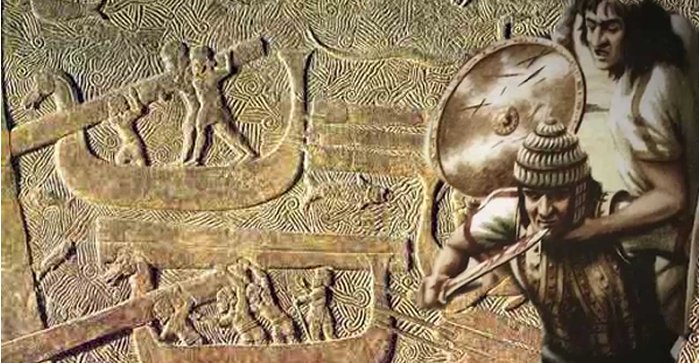“In
fact, the very name “Palestine” is directly responsive to Minoan Crete for it derives
from the word “Philistine” which is the name given to a particular group of
people present in the area by the emerging Hebrews, who themselves were operative
in Palestine from about 1400 BC onwards”.
Alan
Butler and Stephen Dafoe
Alan Butler and Stephen Dafoe tell, in their book The Knights Templar Revealed (Magpie
Books, London, 2006), of the massive impact upon Crete of the Thera (Santorini)
eruption (pp. 21-22):
Archaeology shows the absolute devastation that
followed on Crete, with huge structures literally knocked flat by the force of
the initial explosion and by the tidal waves that followed it. In a very short period
of time, rule of Crete passed into the hands of the Mycenaean civilisation.
Much of the very fertile land in the north of the island would have been
rendered unusable for at least a decade and it is considered likely that a vast
exodus of Cretans took place at this time.
It may or may not be a coincidence that this
period matches very neatly the sudden cessation of megalithic building further
west. It is a fact that weather patterns changed markedly around the time of
the Thera eruption, together with a suspected plague, or series of plagues that
probably decimated populations across the whole body of Europe. … the forced migration
of a large proportion of the Minoan people does seem to have affected many
areas surrounding Crete, not least of all the Palestine coast of the Levant. In
fact, the very name “Palestine” is directly responsive to Minoan Crete for it
derives from the word “Philistine” which is the name given to a particular
group of people present in the area by the emerging Hebrews, who themselves
were operative in Palestine from about 1400 BC onwards.
….
It is clear that the Hebrews knew the Philistines
to be of Cretan origins and doubtless they represented the remnant of the Minoan
civilisation that had fled from Crete either as a result of the Thera eruption
or ahead of the invading Mycenaeans. In the Old Testament we find, in the Book
of Amos chapter 9, verse 7:
Are ye not as children of the Ethiopians unto me, O children of Israel? saith
the Lord. Have not I brought up Israel out of the land of Egypt? And the Philistines
from Caphtor (Crete) and the Syrians from Kir?
On p. 25, the authors note: “The effect of the Minoans, in their alter ego as the Philistines, upon the
area of the Levant was probably quite significant in the years immediately
after the Santorini eruption”.

